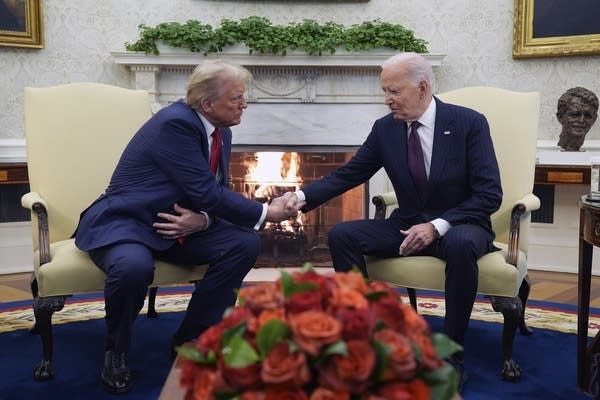Donald Trump, Elon Musk, and Steve Bannon are not celebrated for their subtlety. Their shock-and-awe campaign to bulldoze the federal government is designed to undercut their opposition by force of will. The brazenness — to borrow Adam Serwer’s phrase from the first Trump term — is the point. The billionaires laying off thousands of federal workers are making clear they are going to do what they want, when they want, giving lie to such shibboleths as “democracy dies in darkness.” Turns out, democracy can die in the full light of day.
Last week, I wrote that the shamelessness of the Trump administration is one consequence of a culture that has polarized along the superego. In the war of nazis versus puritans, the nazis have gained the upper hand, and they’re using it to salute to their depravity at 45 degrees.
The naked pursuit of power and profit has animated Trump’s entire political career. There’s even a refreshing honesty to his rapaciousness, which is why he codes as trustworthy to people who believe they’ve been screwed by the buttoned-up establishment, which of course they have been. In the cloak-and-dagger world of politics, all diplomatic smiles and stabs in the back, Trump wields a bazooka and a snarl.
If it’s hard to imagine a Democratic version of Trump, shame and its attendant ambivalence about making difficult choices is one reason why. In fact, I think a central contradiction of liberalism is its ashamedness about power.1
Liberalism has become a politics of means over ends.2 In prioritizing rules and process over direction and outcome, liberalism has, over decades, twisted itself into knots in defense of a constitutional order that the right hollowed out. By refusing to wield its power — to, I don’t know, break up the banks and prosecute the criminal financiers who caused the Great Recession, to use the insurrection at the Capitol on January 6th as reason to ditch the filibuster and reform our broken democracy, to tell the Supreme Court to stuff it after systematically undermining Biden’s presidency — liberalism has alienated its core constituencies, the people it was supposed to help in the first place and who could, theoretically, come to its defense in a time of crisis. This kind of liberalism has produced a lot of experts who know how to accomplish something, but not a lot of citizens with the judgment to know what to do in the first place. It’s…procedural liberalism.

Here’s another fable, to complement the Hans Christian Andersen story from last week: Once upon a time, some rich people designed a system of government meant to put a check on any one person gaining too much power and governing like a king. In order to do this, they had to have a lot of power themselves. But they all felt properly bad about it, unlike the other guys with power. So they wrote some unwritten laws — call them mores — about how desiring power was uncouth and uncool. Then they wrote the real laws that ensured they held onto power anyway, but now they didn’t have to feel bad about it. The end.3
This is one way to read the story of the founding. I don’t buy all of it — I think the rhetorical commitment to equality in the Declaration helped create the conditions to realize a substantive commitment to equality over a few long bloody centuries — but I do think it provides psychological depth to our understanding of liberalism. If we think of liberal governance as giving us the “rules of the game,” then we ought to be suspicious of who wrote them.4
As these rules, liberalism provides a framework, both physical (in institutions like the game board or a state legislature) and psychical (the understanding that you have a fair shot alongside everyone else), but not much else. It’s supposed to be formally robust but content neutral to maximize the freedom of everyone who agrees to participate within the bounds of the structure.
But form is a kind of content. The structure itself has power that shapes us as individuals (and liberalism very much wants us to be individuals and not, say, organized blocs of workers).
My point is that power often hides as process. Maybe you’ve been in meetings where process claims (“is this the right way to do it?”) often advance ideological aims (“I don’t think we should be doing this”). I’m guilty of this too, because it’s easier to appeal to some metaphysical principle than it is to take ownership of what I think is best. But it strikes me as often done in bad faith, a way to hide one’s commitments under the veneer of neutrality.
By outsourcing the difficulty of making decisions — and by extension, of making the wrong decision and thus outsourcing the possibility of shame — to the Rube Goldberg contraption we call the rules of the game, liberals often shrug off the burden of leadership. (I’ve written about this outsourcing, in a different context, before.) Student debt is a good example here. As a candidate, Biden pledged to “eliminate” hundreds of billions of dollars of student loans, only to have his plans struck down by the Supreme Court once in office. He then went about fiddling around the edges of his executive authority, leaving the vast majority of students holding a generational anvil.5
Imagine, instead, if Biden had ordered the debt to be canceled anyway, using the Dobbs decision to argue that the Court was acting as a rogue politician rather than a disinterested adjudicator. Does that sound far-fetched? It shouldn’t, because the idea of “judicial supremacy,” where the Court has the final say on policy, is a relatively recent invention. By deferring to rules that Trump is revealing to be useless fictions, liberals give too much power to procedure and too little to politics.
Process is important. It’s vital, even, because well-designed process can protect against abuse and build collective investment into the outcome. But there needs to be an outcome — a clear, strategic, helpful outcome. Under procedural liberalism, process becomes the highest good, rather than a means to deliver the highest good.
This is why there’s a critique of the Democratic Party as too focused on coalition management that rings true to me.6 In appealing to the rules of the game, procedural liberalism neglects the fact that most of us are losing it, and badly. This is how we get a Democratic Party that appears more concerned about following the rules than with making a meaningful difference in people’s lives. It’s how we went from Joe Biden calling Trump a fascist to welcoming him back into office with a handshake — which calls into question Biden’s judgment and his honesty all at once.
Ultimately, procedural liberalism simply empowers those who think they know how to play the game. When he lost in 2020, Trump flipped the board. He was rewarded for it, and until liberals understand why, they are doomed to keep reciting from a shredded rule sheet.
Burn After Reading
I take the phrase “procedural liberalism” from a 1984 paper by political theorist Michael Sandel. He refers to “the procedural republic,” but I don’t think his term sufficiently captures the process-oriented approach to governance that has defined the Democratic regimes of the last forty years.
“The Procedural Republic and the Unencumbered Self” is a short, lucid, and compelling argument against a familiar conception of liberalism: where the individual is rational and self-interested, negative liberty is sacrosanct, and “rights are trumps” (yes that’s the word he uses). Sandel sees the republic as increasingly sprawling and increasingly impotent. Without recourse to a common mission, it falls back on the lowest common denominator of proceduralism to manage its affairs. This poses challenges:
liberty in the procedural republic is defined in opposition to democracy, as an individual's guarantee against what the majority might will. I am free insofar as I am the bearer of rights, where rights are trumps
and
power shifts away from democratic institutions (such as legislatures and political parties) and toward institutions designed to be insulated from democratic pressures, and hence better equipped to dispense and defend individual rights (notably the judiciary and bureaucracy).
This is the form of government we now live under. It’s not just that any rights are trumps, it’s the rights of billionaires that are trumps. Peter Thiel famously mused that “I no longer believe that freedom and democracy are compatible” precisely because he thinks his freedom to become a billionaire — a king by another name — is more important than the institutions of democracy.
If you don’t know where you want to go, no amount of procedure will get you there. But the billionaires sure know where they’re going.
I realize liberalism is a bit of a weasel word, and I’m going to be weasley with it, employing it in two senses: as the Enlightenment political philosophy of individual rights and as the governing ideology of America’s pro-welfare state coalition in the aftermath of the New Deal’s collapse.
and if Trump has his way, it’ll mean the end of politics. Zing.
This is, kinda sorta, the French aristocrat Alexis de Tocqueville’s critique of the young republic in Democracy in America.
I’m going to stick with “rules of the game” for consistency’s sake, but I think another image, the marketplace of ideas, could work just as well. It’s not lost on me that games and markets are two more enlightenment forms of the battlefield.
According to the Center for American Progress’ student debt tracker, “5.3 million Americans have seen some or all of their student loans canceled since March 2021.” That’s nice, of course, but 42.7 million students have federal loans, per the Education Data Initiative. To his credit, Biden provided more relief to 150,000 students in his final days in office.





This all checks out. A real preacher and choir situation here.